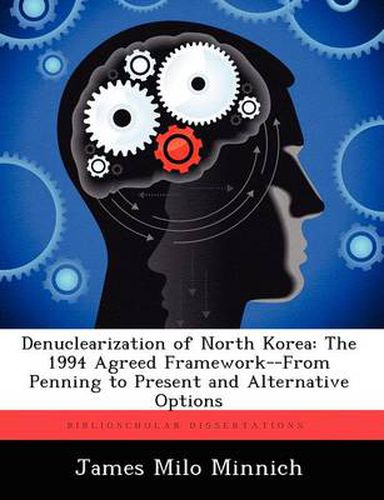Readings Newsletter
Become a Readings Member to make your shopping experience even easier.
Sign in or sign up for free!
You’re not far away from qualifying for FREE standard shipping within Australia
You’ve qualified for FREE standard shipping within Australia
The cart is loading…






This title is printed to order. This book may have been self-published. If so, we cannot guarantee the quality of the content. In the main most books will have gone through the editing process however some may not. We therefore suggest that you be aware of this before ordering this book. If in doubt check either the author or publisher’s details as we are unable to accept any returns unless they are faulty. Please contact us if you have any questions.
The denuclearization of North Korea, a formalized policy objective of the United States since the signing of the 1994 Agreed Framework, is the singularly most important objective of Washington regarding Pyongyang. The Agreed Framework is an accord that provides North Korea two light-water reactors in exchange for the elimination of its capabilities to produce nuclear weapons. However, many debates have arisen over the soundness of this policy option. The purpose of this thesis is to assess four different policy options for achieving the permanent or long-term denuclearization of North Korea: (1) the Agreed Framework, (2) the Amended Framework Option, (3) the Comprehensive Framework Option, and (4) the Coercive Denuclearization Option. The analysis of the Agreed Framework centers on obstacles that might prohibit its completion. The analysis of the Amended Framework focuses on North Korea’s inability to distribute the energy that the LWRs will produce. The Comprehensive Framework analyzes the effects of the United States attaching additional conditions to the Agreed Framework. Lastly the, Coercive Denuclearization Option analyzes whether or not preemptive counterproliferation could force North Korea to abandon its nuclear weapons program. The conclusion of this thesis suggests that none of the evaluated policy options will lead to the denuclearization of North Korea.
$9.00 standard shipping within Australia
FREE standard shipping within Australia for orders over $100.00
Express & International shipping calculated at checkout
Stock availability can be subject to change without notice. We recommend calling the shop or contacting our online team to check availability of low stock items. Please see our Shopping Online page for more details.
This title is printed to order. This book may have been self-published. If so, we cannot guarantee the quality of the content. In the main most books will have gone through the editing process however some may not. We therefore suggest that you be aware of this before ordering this book. If in doubt check either the author or publisher’s details as we are unable to accept any returns unless they are faulty. Please contact us if you have any questions.
The denuclearization of North Korea, a formalized policy objective of the United States since the signing of the 1994 Agreed Framework, is the singularly most important objective of Washington regarding Pyongyang. The Agreed Framework is an accord that provides North Korea two light-water reactors in exchange for the elimination of its capabilities to produce nuclear weapons. However, many debates have arisen over the soundness of this policy option. The purpose of this thesis is to assess four different policy options for achieving the permanent or long-term denuclearization of North Korea: (1) the Agreed Framework, (2) the Amended Framework Option, (3) the Comprehensive Framework Option, and (4) the Coercive Denuclearization Option. The analysis of the Agreed Framework centers on obstacles that might prohibit its completion. The analysis of the Amended Framework focuses on North Korea’s inability to distribute the energy that the LWRs will produce. The Comprehensive Framework analyzes the effects of the United States attaching additional conditions to the Agreed Framework. Lastly the, Coercive Denuclearization Option analyzes whether or not preemptive counterproliferation could force North Korea to abandon its nuclear weapons program. The conclusion of this thesis suggests that none of the evaluated policy options will lead to the denuclearization of North Korea.